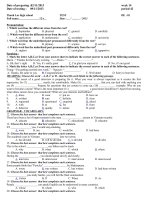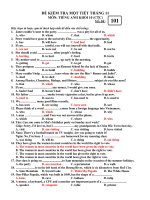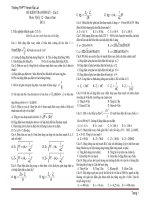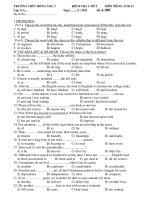KIỂM TRA 1 TIẾT – TEST 1 MÔN : TIẾNG ANH 12 ĐỀ A pdf
Bạn đang xem bản rút gọn của tài liệu. Xem và tải ngay bản đầy đủ của tài liệu tại đây (58.88 KB, 2 trang )
English 12 KIỂM TRA 1 TIẾT – TEST 1
(Unit 1-2) MÔN : TIẾNG ANH 12
ĐỀ A :
1–5. Choose one word whose underlined part is pronounced differently from the others.
1. A. learned B. sacred C. believed D. decided
2. A. liked B. learned C. laughed D. stopped
3. A. moaned B. presented C. viewed D. robbed
4. A. fills B. adds C. stirs D. lets
5. A. airports B. suitcases C. things D. calculators
6–10. Choose one word whose stress pattern is different. Identify your answer by choosing the corresponding letter A,
B, C, or D.
6. A. romantic B. following C. summary D. physical
7. A. determine B. appearance C. develop D. different
8. A. contractual B. significant C. Asian D. demanding
9. A. decision B. reference C. refusal D. important
10. A. birthday B. cowboy C. enjoy D. pleasure
11-35. Choose the best answer A, B, C or D.
11. When I last saw him, he ………… in London.
A. has lived B. is living C. was living D. has been living
12. We ………… Dorothy since last Saturday.
A. don’t see B. haven’t seen C. didn’t see D. hadn’t seen
13. The train ………… half an hour ago.
A. has been leaving B. left C. has left D. had left
14. Jack ………… the door.
A. has just painted B. paint C. will have painted D. painting
15. My sister ………… for you since yesterday.
A. is looking B. was looking C. has been looking D. looked
16. I ………… Texas State University now.
A. am attending B. attend C. was attending D. attended
17. He has been selling motorbikes …………
A. ten years ago B. since ten years C. for ten years ago D. for ten years
18. Don’t worry ! By the time you arrive tomorrow, we ………… the work.
A. have finished B. would finish C. will finish D. will have finished
19. While I ………… along the road, I saw a friend of mine.
A. had cycled B. have cycled C. cycled D. was cycling
20. People often ………… confidence when they are criticized.
A. lose B. fail C. drop D. omit
21. “Did you meet Ann here at the university ?” “No, we ………… when I started college.”
A. have already met B. had already met
C. had already been meeting D. already met
22. “Would you like to go to the pop concert?” “Thanks, but I ………… it already.”
A. had seen B. have been seeing C. have seen D. did see
23. “What did you do last night?” “I watched TV, practised the piano, and ………… my homework.”
A. made B. do C. done D. did
24. “Why is John so sad?” “Because his bird ………… away.”
A. flown B. flew C. fly D. had flown
25. I ………… to the same barber since last year.
A. am going B. have been going C. go D. had going
26. The electricity failed while she ………… the dinner.
A. cooked B. was cooking C. has cooked D. had been cooking
27. The bus always ………… here to pick up passengers.
A. is stopping B. stops C. has stopped D. will stop
28. I saw a bear while I ………… in the forest.
A. am walking B. walked C. were walking D. was walking
29. Three weeks ____ not enough holiday.
A. are B. were C. was D. been
30. Each of you ____ a share in the work.
A. having B. has C. to have D. have
31. Ten pounds ____ too much to pay
A. is B. being C. are D. were
32. A number of students ____ volunteered to the job.
A. have B. has C. to have D. having
33. There ____ a few flowers in this garden last summer.
A. being B. were C. are D. is
34. A large number of reporters ____ at the meeting yesterday.
A. being B. were C. are D. is
35. A number of workers ____ asked for a rise since last month.
A. have B. has C. having D. to have
36-40. Find out the mistake in each sentence by choosing A,B,C or D.
36. Last year my little brother got lost while we had gone shopping.
A B C D
37. Is he aware of how long we are waiting for the tour to start ?
A B C D
38. They asked me what did happen last night, but I was unable to tell them.
A B C D
39. The director, as well as his wife and two children, were injured in the accident.
A B C D
40. John used to working in Leeds, but his company had him transfer to a better position in London.
A B C D
41-45. Fill in each of the numbered blanks with one suitable word or phrase:
In the home a dad is very important. He is the (41)… …. who provides us with money to feed and clothe ourselves.
He can decorate your bedroom, mend your radio, make cages for your pets, repair a puncture in your bicycle tyre and
help you with maths homework. A dad can be very useful for (42) … you in the car to and from parties, music and
dancing lessons. A dad is the person whom you ask for pocket money. He is the one who (43) …… about the time
you spend talking on the phone, as he has to pay for the bills. Dad is someone who will support you in a(n) (44)… … ,
if he believes you to be right. He is someone who reads your school (45) … and treats if it is good. A dad likes to
come into a nice happy home evening, and settle back in his chair with a newspaper. He likes to recall his National
Service days.
41. A. man B. someone C. person D. anyone
42. A. bringing B. taking C. picking D. carrying
43. A. explains B. shouts C. complains D. groans
44. A. talk B. discussion C. disagreement D. argument
45. A. report B. result C. record D. review
46-50. Read the following passage, choose the correct answer for each question by choosing A,B, C, or D.
The nuclear family, consisting of a mother, father, and their children, may be more an American ideal than an
American reality. Of course, the so-called traditional American family was always more varied than we had been led to
believe, reflecting the very different racial, ethnic, class, and religious customs among American groups. The most
recent government statistics reveal that only about one third of all current American families fit the traditional mold
and another third consists of married couples who either have no children or have none still living at home. Of the final
one, about 20 percent of the total number of American households are single people, usually women over sixty-five
years old. A small percentage, about 3 percent of the total, consists of unmarried people who choose to live together,
and the rest, about 7 percent, are single, usually divorced parents, with at least one child. Today, these varied family
types are typical, and therefore, normal. Apparently, many Americans are achieving supportive relationships in family
forms other than the traditional one.
46. With what topic is the passage mainly concerned ?
A. The traditional American family. B. The nuclear family.
C. The current American family. D. The ideal family.
47. The author implies that ………………………….
A. there have always been a wider variety of family arrangements in the United States.
B. racial, ethnic, and religious groups have presented the traditional family structure.
C. the ideal American family in the best structure.
D. fewer married couples are having children.
48. The word “current” in the fourth sentence could be best replaced by which of the following ?
A. typical B. present C. perfect D. traditional
49. According to the passage, married couples whose children have grown or who have no children represent
……………………
A. 33 percent of households. B. 20 percent of households.
C. 7 percent of households. D. 3 percent of households.
50. Who generally constitutes a one-person household ?
A. A single man in his twenties. B. A elderly man.
C. A single woman in her late sixties. D. A divorced woman.
THE END OF THE TEST









